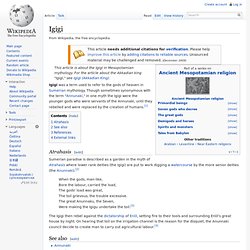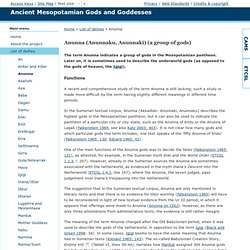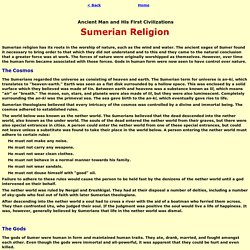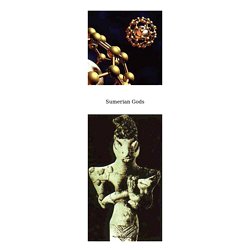

Igigi. Igigi was a term used to refer to the gods of heaven in Sumerian mythology.

Though sometimes synonymous with the term "Annunaki," in one myth the Igigi were the younger gods who were servants of the Annunaki, until they rebelled and were replaced by the creation of humans.[1] Atrahasis[edit] Sumerian paradise is described as a garden in the myth of Atrahasis where lower rank deities (the Igigi) are put to work digging a watercourse by the more senior deities (the Anunnaki).[2] When the gods, man-like, Bore the labour, carried the load, The gods' load was great, The toil grievous, the trouble excessive.
The great Anunnaku, the Seven, Were making the Igigu undertake the toil.[3] The Igigi then rebel against the dictatorship of Enlil, setting fire to their tools and surrounding Enlil's great house by night. See also[edit] References[edit] Jump up ^ Leick, Gwendolyn: A Dictionary of Ancient Near Eastern Mythology (NY: Routledge, 1998), p. 85Jump up ^ William P. External links[edit] ETCSL:ETCSLcorpus. Ancient Mesopotamian Gods and Goddesses - Anunna (Anunnaku, Anunnaki) (a group of gods) The term Anunna indicates a group of gods in the Mesopotamian pantheon.

Later on, it is sometimes used to describe the underworld gods (as opposed to the gods of heaven, the Igigi). Functions A recent and comprehensive study of the term Anunna is still lacking; such a study is made more difficult by the term having slightly different meanings in different time periods. In the Sumerian textual corpus, Anunna (Akkadian: Anunnaki, Anunnaku) describes the highest gods in the Mesopotamian pantheon, but it can also be used to indicate the pantheon of a particular city or city-state, such as the Anunna of Eridu or the Anunna of Lagaš (Falkenstein 1965, see also Katz 2003: 403).
It is not clear how many gods and which particular gods this term includes; one text speaks of the 'fifty Anunna of Eridu' (Falkenstein 1965: 130; Edzard 1965: 42). It appears that there was some confusion surrounding this terms already in antiquity (Kienast 1965: 144). Divine Genealogy and Syncretisms. Sumerian Gods and Goddesses. Sumerian Religion. Sumerian Religion Sumerian religion has its roots in the worship of nature, such as the wind and water.

The ancient sages of Sumer found it necessary to bring order to that which they did not understand and to this end they came to the natural conclusion that a greater force was at work. The forces of nature were originally worshipped as themselves. However, over time the human form became associated with those forces. Gods in human form were now seen to have control over nature. The Cosmos The Sumerians regarded the universe as consisting of heaven and earth.
Sumerian theologians believed that every intricacy of the cosmos was controlled by a divine and immortal being. The world below was known as the nether world. He must not make any noise. He must not carry any weapons. He must not wear clean clothes. He must not behave in a normal manner towards his family. He must not wear sandals. He must not douse himself with "good" oil. The nether world was ruled by Nergal and Ereshkigal. Mesopotamian Gods Table. Sumerian Deities. Sumerian religion. Sumerian Gods and Goddesses - Anunnaki. Sumerian Gods Is Anu holding the symbolic Holy Grail of a Bloodline he created?

British Museum Nephilim, Anunnaki - Royal Bloodline - Creators "Those who from Heaven to Earth came" The Sumerian King List allegedly recorded all the rulers of Earth over 400,000 years who were said to be gods, demigods, or immortals ... or one soul playing all the roles. In Sumerian Mythology the Anunnaki were a pantheon of good and evil gods and goddesses (duality) who came to Earth to create the human race.
Talismans | Kabbalah | Amulets Creating Bloodlines According to Ancient Alien Theory, the Anunnaki, and other alien groups, came to Earth and seeded the human race in many variations. Physical evidence of ancient astronauts is found throughout the planet, leading one to conclude that different races visited here at different periods in Earth's history, or the same aliens return and set up various programs (civilizations) in which they could remain and experience. These would include: Middle East, Egypt, India,